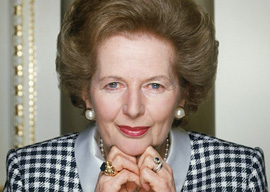
April 10, 2013

Baroness Margaret Thatcher
England is not Italy, where people think it natural to find workarounds to corruption and dysfunction. For many centuries, the English have preferred a national government that is if not authoritarian at least authoritative. Thatcher sold off most of the nationalized industry and tamed labor lawlessness. In turn, Tory victories induced the Labour Party to modernize itself by cutting its fiduciary tie to trade unions.
Similarly, foreign affairs were radically different during the ominous Cold War. As Gen. Odom pointed out in his 2000 book The Collapse of the Soviet Military, by the mid-1980s the Soviet Union had 5.3 million personnel in uniform and 53,000 tanks pointed at Western Europe. This threat was several orders of magnitude greater than any we’ve had to deal with in this century.
The danger was not that the aged hacks of the Kremlin had an Alexandrine urge to conquer the world, but that that they would continue to be tempted into foreign adventures to shore up their rule at home by bullying abroad.
From 1976 onward, the Soviets deployed SS-20 intermediate range nuclear missiles, which, in the Cold War’s bizarre but terrifying logic, were destabilizing precisely because they weren’t intercontinental ballistic missiles that could threaten the United States.
NATO had long deterred the vast Red Army by threatening to respond to a Warsaw Pact offensive in the Fulda Gap with battlefield nuclear weapons and then, it was often fatalistically assumed, intercontinental nuclear missiles. But Moscow’s development of an accurate intermediate range missile that could conceivably confine World War III to Europe was a political breakthrough that spotlighted the central psychological weakness of NATO: Would the US, protected by the Atlantic, and the UK, protected by the English Channel, launch ICBMs to save West Germany?
Really?
Charles de Gaulle had pulled France out of NATO in 1967 because he preferred that France control its own nuclear weapons. But West Germany, as the loser in World War II, was not allowed to have its own nuclear deterrent.
So if the Anglo-Saxons wouldn’t risk their homelands for the West Germans, why shouldn’t the West Germans negotiate submission to the Soviets on Finland’s mild terms before World War III rather than on the terms that East Germany got from Stalin after World War II: ruin and rape?
To forestall this not altogether unreasonable line of thought, Thatcher, Jimmy Carter, Helmut Schmidt, and other NATO leaders signed an agreement in 1979 to install their own intermediate-range Pershing missiles in Europe by 1983. The idea was to give NATO a semi-credible deterrent that wouldn’t require an American president to push the button to launch missiles from North Dakota.
In response, the KGB promoted a “nuclear freeze” (a once vast political movement so forgotten today that it doesn’t even have its own Wikipedia page) to persuade voters in the West to instead acquiesce in intermediate-range missile inferiority and thus set in motion the consequent Finlandization.
In the spring of 1982, this Soviet model of foreign meddling to lessen domestic vulnerability was suddenly replicated at the other end of the world when the Argentine military dictatorship responded to demonstrations in Buenos Aires by seizing Britain’s Falkland Islands. Mrs. Thatcher dispatched the Royal Navy eight thousand miles, losing five ships to a brave and resourceful Argentine air force. Ultimately, the Brits won an improbable victory. The next year, the Argentine military was permanently driven from political power, while Mrs. Thatcher won reelection.
Even more importantly, the year after the Falklands War, the anti-nuclear freeze right won the historically decisive West German election. Mrs. Thatcher’s display of Anglo-Saxon resolve in the Falklands, where little besides principle was at stake, helped persuade West German voters to reaffirm their alliance with the ascendant Anglo-Americans. In retrospect, this 1983 failure of the nuclear freeze movement doomed the Soviet Union.
Understandably, the triumphs of the 1980s have inclined Republican politicians in the United States to run ever since as if it’s always 1980, with tax cuts and more military spending as the best solutions for what ails us now. But the greatest statesmen and stateswomen solve some problems”such as 98 percent tax rates and the Red Army’s 53,000 tanks”permanently, leaving their heirs with new tasks.